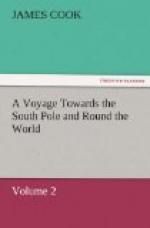Next morning at sun-rise, we made sail, stretching to S.S.W., and weathered the island; on the south side of which lie two isles, that serve as roosting and breeding-places for birds. On this, as also on the S.E. side, is a sandy beach; whereas most of the other shores are bounded by rocky cliffs, which have twenty and eighteen fathoms water close to them: At least so we found it on the N.E. side, and with good anchorage. A bank of coral sand, mixed with shells, on which we found from nineteen to thirty-five or forty fathoms water, surrounds the isle, and extends, especially to the south, seven leagues off. The morning we discovered the island, the variation was found to be 13 deg. 9’ E.; but I think this observation gave too much, as others which we had, both before and after, gave 2 deg. less.
After leaving Norfolk Isle, I steered for New Zealand, my intention being to touch at Queen Charlotte’s Sound, to refresh my crew, and put the ship in a condition to encounter the southern latitudes.
On the 17th, at day-break, we saw Mount Egmont, which was covered with everlasting snow, bearing S.E. 1/2 E. Our distance from the shore was about eight leagues, and, on sounding, we found seventy fathoms water, a muddy bottom. The wind soon fixed in the western board, and blew a fresh gale, with which we steered S.S.E. for Queen Charlotte’s Sound, with a view of falling in with Cape Stephens. At noon Cape Egmont bore E.N.E. distant three or four leagues; and though the mount was hid in the clouds, we judged it to be in the same direction as the Cape; latitude observed 39 deg. 24’. The wind increased in such a manner as to oblige us to close-reef our top-sails, and strike top-gallant yards. At last we could bear no more sail than the two courses, and two close-reefed top-sails; and under them we stretched for Cape Stephens, which we made at eleven o’clock at night.
At midnight we tacked and made a trip to the north till three o’clock next morning, when we bore away for the sound. At nine we hauled round Point Jackson through a sea which looked terrible, occasioned by a rapid tide, and a high wind; but as we knew the coast, it did not alarm us. At eleven o’clock we anchored before Ship Cove; the strong flurries from off the land not permitting us to get in.
In the afternoon, as we could not move the ship, I went into the Cove, with the seine, to try to catch some fish. The first thing I did after landing, was to look for the bottle I left hid when last there, in which was the memorandum. It was taken away, but by whom it did not appear. Two hauls with the seine producing only four small fish, we, in some measure, made up for this deficiency, by shooting several birds, which the flowers in the garden had drawn thither, as also some old shags, and by robbing the nests of some young ones.




